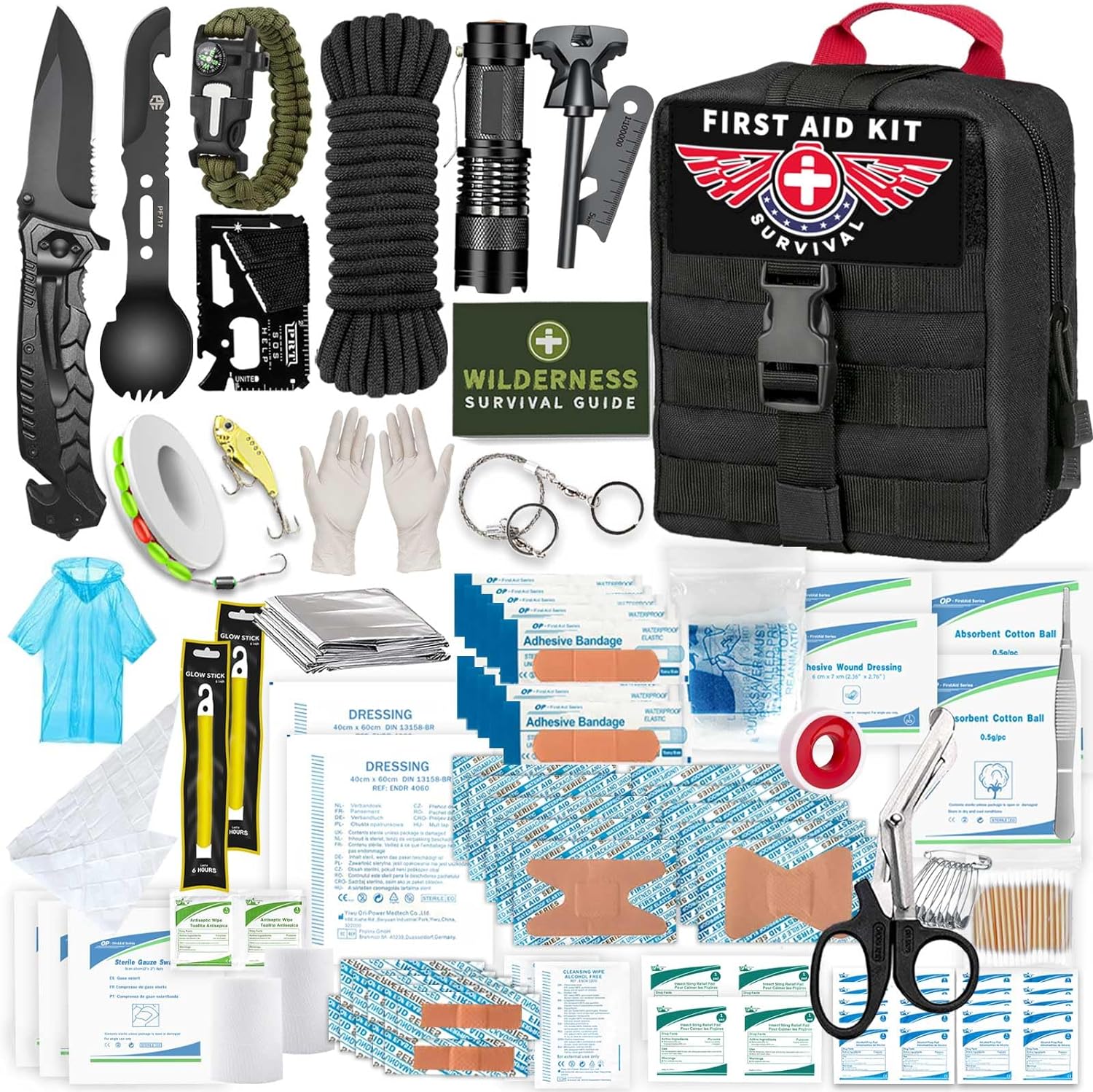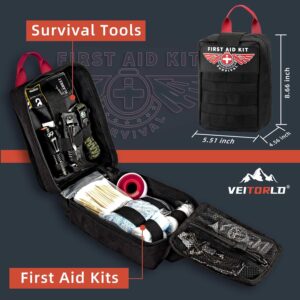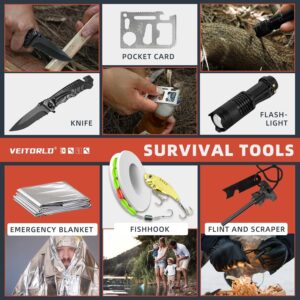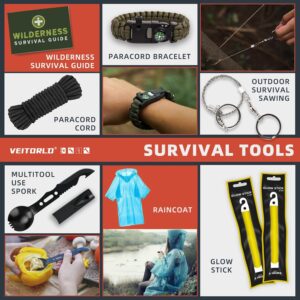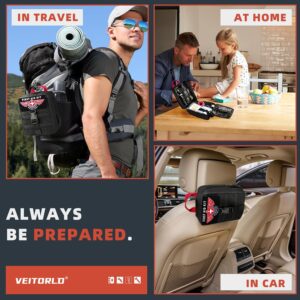Ultimate Guide to Essential Survival Gear for Adventurous Men
Introduction
In the ever-changing world of outdoor adventures, having the right gear is crucial for ensuring safety and enhancing the overall experience. Whether you’re preparing for an unexpected emergency, an earthquake, or a thrilling expedition into the wild, the importance of reliable survival gear cannot be overstated. This comprehensive guide delves into the must-have items for any adventurous man, emphasizing quality, functionality, and preparedness.
Essential Survival Gear Checklist
1. Survival Kits and Emergency Preparedness
Comprehensive Survival Kits
A well-rounded survival kit is the cornerstone of any adventurer’s gear. It should include:
- First Aid Supplies: Bandages, antiseptics, pain relievers, tweezers, and medical tape.
- Navigation Tools: Compass, maps, and GPS devices.
- Fire Starters: Waterproof matches, lighters, and fire starter kits.
- Shelter: Emergency blankets, bevy bags, and tarps.
- Food and Water Supplies: High-calorie energy bars, water purification tablets, and portable filters.
- Multi-Tools: Versatile tools that can perform various functions such as cutting, sawing, and opening cans.
2. High-Quality Camping Gear
Tents and Sleeping Bags
Invest in durable, weather-resistant tents and sleeping bags designed for extreme conditions. Key features to consider:
- Weather Resistance: Look for waterproof and windproof materials.
- Portability: Lightweight and compact options are ideal for easy transportation.
- Comfort: Ensure sufficient insulation and comfort for a good night’s sleep.
Cooking Equipment
Essential cooking gear includes:
- Portable Stoves: Lightweight and fuel-efficient stoves for cooking on the go.
- Cookware: Non-stick pots and pans that are easy to clean.
- Utensils: Compact and multi-functional utensils.
3. Outdoor Clothing and Footwear
Weather-Appropriate Clothing
Choose clothing that provides protection and comfort in various weather conditions:
- Base Layers: Moisture-wicking materials to keep you dry.
- Insulation: Fleece or down jackets for warmth.
- Outer Layers: Waterproof and windproof jackets and pants.
ootwear

Proper footwear is critical for any adventure:
- Hiking Boots: Durable, waterproof, and comfortable boots with good ankle support.
- Socks: Moisture-wicking and quick-drying socks to prevent blisters.
4. Navigation and Communication Devices
GPS and Compasses
Reliable navigation tools are essential for staying on track:
- GPS Devices: Handheld GPS units with topographic maps.
- Compasses: High-quality, reliable compasses as a backup.
Communication Tools
Stay connected with:
- Two-Way Radios: Reliable communication in areas with no cell service.
- Satellite Phones: Essential for remote locations.
5. Safety and Self-Defense
Personal Safety
Equip yourself with tools to ensure safety:
- Pepper Spray: Non-lethal defense against wildlife and potential threats.
- Survival Whistles: Audible signals for emergency situations.
- Headlamps and Flashlights: Hands-free lighting options for nighttime visibility.
6. Hydration Systems
Water Storage and Purification
Maintaining hydration is critical:
- Hydration Packs: Convenient and easy-to-carry water storage solutions.
- Water Purification: Portable water filters and purification tablets to ensure safe drinking water.
7. Specialized Adventure Gear
Climbing and Mountaineering Equipment
For the more daring adventurers:
- Climbing Harnesses: Secure and comfortable harnesses for rock climbing.
- Ropes and Carabiners: Essential for safe climbing practices.
- Ice Axes and Crampons: Necessary for icy and mountainous terrain.
Conclusion
Equipping yourself with the right survival gear is essential for any adventurous journey. Prioritize quality and functionality to ensure you’re prepared for any situation, from emergency scenarios to thrilling outdoor activities. With this comprehensive guide, you’ll be well-equipped to face the challenges of the great outdoors with confidence and resilience.
Frequently Asked Questions (FAQs)
1. What should I include in my basic survival kit?
A basic survival kit should include first aid supplies, navigation tools (like a compass and maps), fire starters (waterproof matches, lighters), shelter materials (emergency blankets, tarps), food and water supplies (energy bars, water purification tablets), and multi-tools for various tasks.
2. How do I choose the right tent for camping?
When choosing a tent, consider weather resistance, portability, and comfort. Look for tents made of waterproof and windproof materials, that are lightweight and easy to carry, and that offer sufficient space and insulation for a comfortable sleep.
3. What kind of clothing is best for outdoor adventures?
Choose clothing based on the weather conditions you expect to encounter. Base layers should be moisture-wicking, insulation layers should provide warmth (like fleece or down jackets), and outer layers should be waterproof and windproof to protect against the elements.
4. Why is proper footwear important for outdoor activities?
Proper footwear is crucial to prevent injuries and ensure comfort during outdoor activities. Hiking boots should be durable, waterproof, and provide good ankle support. Additionally, moisture-wicking and quick-drying socks are important to keep feet dry and prevent blisters.
5. What navigation tools are essential for outdoor survival?
Essential navigation tools include a reliable GPS device with topographic maps and a high-quality compass as a backup. These tools help ensure you can navigate safely and avoid getting lost.
6. How can I stay connected in remote areas?
In remote areas where cell service is unavailable, two-way radios and satellite phones are essential for communication. These devices ensure you can stay in touch with others and call for help if needed.
7. What safety and self-defense items should I carry?
For personal safety, carry items like pepper spray for self-defense against wildlife or potential threats, survival whistles for signaling emergencies, and headlamps or flashlights for visibility in the dark.
8. How do I maintain hydration during outdoor activities?
Hydration packs are convenient for carrying water, and portable water filters or purification tablets are essential for ensuring safe drinking water from natural sources. These tools help maintain hydration and prevent dehydration.
9. What specialized gear do I need for climbing and mountaineering?
For climbing and mountaineering, essential gear includes climbing harnesses for safety, ropes and carabiners for secure climbing practices, and ice axes and crampons for navigating icy or mountainous terrain.
10. How can I ensure my survival gear is of high quality?
To ensure high-quality survival gear, purchase from reputable brands known for their durability and reliability. Reading reviews and checking product specifications can also help determine the quality of the gear.
Pros and Cons of Essential Survival Gear
Survival Kits
Pros:
- Comprehensive Coverage: Includes a wide range of essential items for various emergencies.
- Convenience: Pre-assembled kits save time and effort in gathering individual items.
- Compact: Often designed to be portable and easy to carry.
Cons:
- Cost: High-quality kits can be expensive.
- Generic Contents: May not perfectly match individual needs or preferences.
- Weight: Can be heavy if fully equipped.
Camping Tents
Pros:
- Weather Protection: Provides shelter from rain, wind, and insects.
- Comfort: Enhances sleep quality and overall comfort.
- Durability: High-quality tents are built to withstand harsh conditions.
Cons:
- Setup Time: Can be time-consuming and require practice to set up correctly.
- Weight and Bulk: Can be heavy and take up significant space in a backpack.
- Cost: High-end tents can be expensive.
Sleeping Bags
Pros:
- Insulation: Provides warmth and comfort in various temperatures.
- Compact: Many are designed to be lightweight and easy to pack.
- Versatility: Available in different temperature ratings for various climates.
Cons:
- Size: Some sleeping bags can be bulky and difficult to compress.
- Cleaning: Can be challenging to clean and maintain.
- Cost: High-quality sleeping bags can be pricey.
Outdoor Clothing
Pros:
- Protection: Offers protection against weather and environmental hazards.
- Comfort: Enhances comfort during physical activities.
- Durability: Designed to withstand outdoor conditions.
Cons:
- Cost: Technical outdoor clothing can be expensive.
- Maintenance: Requires proper care and maintenance to retain functionality.
- Fit: Finding the right fit can be challenging, affecting comfort and mobility.
Footwear
Pros:
- Support: Provides necessary support and protection for feet and ankles.
- Durability: Built to endure rough terrains and harsh conditions.
- Comfort: Enhances comfort during long hikes and outdoor activities.
Cons:
- Break-in Period: New footwear may require time to become comfortable.
- Weight: High-quality boots can be heavy.
- Cost: Good hiking boots can be expensive.
Navigation Tools
Pros:
- Reliability: Essential for navigating and preventing getting lost.
- Accuracy: High-quality tools provide precise navigation.
- Backup: Compasses serve as a reliable backup to electronic devices.
Cons:
- Complexity: Requires knowledge and practice to use effectively.
- Dependence on Batteries: GPS devices need power sources.
- Cost: High-end GPS devices can be costly.
Communication Devices
Pros:
- Safety: Ensures communication in remote areas without cell service.
- Reliability: Two-way radios and satellite phones are dependable.
- Range: Provides extensive communication range.
Cons:
- Cost: Satellite phones and high-quality radios can be expensive.
- Weight: Additional weight to carry.
- Dependence on Power: Requires batteries or charging.
Safety and Self-Defense Items
Pros:
- Protection: Offers defense against potential threats.
- Peace of Mind: Enhances sense of safety and security.
- Portability: Many items are compact and easy to carry.
Cons:
- Legal Restrictions: Some items may be restricted or illegal in certain areas.
- Effectiveness: Varies based on the situation and proper use.
- Training: Requires knowledge and practice to use effectively.
Hydration Systems
Pros:
- Convenience: Easy to carry and use while on the move.
- Health: Ensures access to safe drinking water.
- Versatility: Suitable for various outdoor activities.
Cons:
- Weight: Full hydration packs can be heavy.
- Maintenance: Requires regular cleaning to prevent bacteria growth.
- Durability: Some systems may be prone to leaks or damage.
Specialized Adventure Gear
Pros:
- Safety: Essential for specific activities like climbing or mountaineering.
- Performance: Enhances performance and efficiency in specialized tasks.
- Reliability: High-quality gear ensures safety and durability.
Cons:
- Cost: Specialized gear can be very expensive.
- Weight: Adds extra weight to your load.
- Complexity: Requires knowledge and training to use properly.

